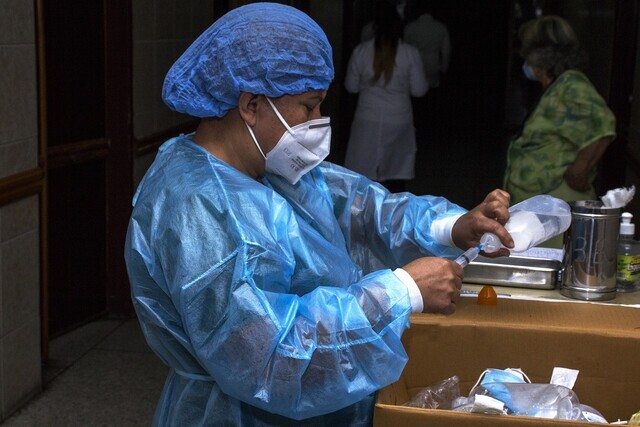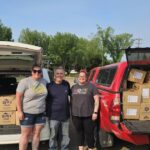The sun poured through the tall windows of Vernon Jubilee Hospital’s east wing as Sophia Ramirez adjusted a blood pressure cuff on her elderly patient’s arm. After five years as a health care assistant, she’s developed a gentle efficiency, the kind that comes from countless hours of frontline care.
“I’ve always wanted to do more,” Sophia told me when I visited Vernon last week. “I love my work, but there’s this ceiling you hit, where you want to provide more comprehensive care but can’t without more training.”
For Sophia and nine other health care assistants in Vernon, that ceiling is about to disappear.
The B.C. government recently announced $2.7 million in funding to help health care assistants upgrade their qualifications to become licensed practical nurses. Part of this investment will directly benefit workers in Vernon, offering a pathway that previously seemed financially out of reach for many.
The program, starting this September through Okanagan College, allows these frontline workers to continue earning income while advancing their careers through a specialized bridging program. This isn’t just another government announcement – it represents a lifeline for healthcare workers like Sophia who have been stretched thin during increasingly difficult years.
“We’re essentially creating our own healthcare workforce from within,” explains Dr. Eleanor Stevens, Chief of Staff at Vernon Jubilee Hospital. “These health care assistants already understand our systems, our patients, and our community needs. They just need the additional clinical skills and certification.”
The practical nurse training program typically costs around $15,000 – a prohibitive amount for many healthcare workers supporting families on modest wages. The new funding covers tuition and provides some support for living expenses during the intensive 16-month program.
Statistics from the BC Care Providers Association show the Interior Health region faces a projected shortage of nearly 900 practical nurses by 2025. Vernon’s situation mirrors the provincial crisis, where staffing shortages have led to temporary closures of rural emergency departments and reduced services.
Walking through the long-term care facility adjacent to the hospital, I met Kai Nilsson, another healthcare assistant hoping to secure one of the funded positions.
“This is my community,” Kai said, gesturing toward the mountains visible through the window. “My grandmother is in care here. I want to stay and provide better healthcare for Vernon, but without this program, I’d probably have to relocate to a larger center for school or better pay.”
The program isn’t just about individual career advancement – it’s a pragmatic solution to address critical healthcare gaps. Licensed practical nurses can administer medications, perform certain medical procedures, and provide more advanced assessments than healthcare assistants. In rural settings like Vernon, this expanded scope can mean the difference between patients receiving timely care locally or facing lengthy transfers to larger centers.
“We call it the rural multiplier effect,” says Joanne Harper, Director of Clinical Operations at Interior Health. “Every practical nurse we can add in a community like Vernon has an outsized impact compared to urban centers. They’re often the backbone of our rural healthcare system.”
What makes this program unique is its recognition of prior learning. Healthcare assistants won’t start from scratch – their existing knowledge and experience will be credited, allowing them to complete the practical nursing program in roughly half the standard time.
The Regional District of North Okanagan has been advocating for this type of program for years. Data from the 2021 census shows nearly 22% of Vernon’s population is over 65, compared to the provincial average of 18.3%. This aging demographic puts additional pressure on an already strained healthcare system.
“This is exactly the kind of targeted investment we need,” Vernon Mayor Victor Cumming told me over coffee at a downtown café. “Instead of throwing money at the problem from afar, this approach recognizes the wisdom of investing in people who are already committed to our community.”
The funding comes after a BC Nurses’ Union survey revealed that 76% of nurses reported regular understaffing in their facilities, with rural areas experiencing the most severe impacts. At Vernon Jubilee Hospital, staff regularly work overtime to cover gaps, a situation that medical leadership acknowledges is unsustainable.
For healthcare assistants like Marco Diaz, who emigrated from the Philippines five years ago and settled in Vernon, the program represents more than career advancement – it’s about belonging.
“I’ve been taking night courses in biology and anatomy to prepare,” Marco explained while on his break. “This community welcomed my family when we arrived. Being able to provide more skilled care here is my way of giving back.”
The Vernon program will select candidates through an application process that considers work experience, academic preparation, and commitment to serving the community after graduation. Priority will be given to those willing to sign agreements to work in the region for at least two years after receiving their practical nursing license.
What struck me most during my time in Vernon wasn’t just the statistics or funding figures – it was the palpable sense of hope among healthcare workers who have weathered extraordinary challenges. These aren’t just positions being filled; these are community members being empowered to care for their neighbors with greater skill and authority.
As the afternoon sun cast long shadows across the hospital parking lot, I watched healthcare assistants changing shifts – some heading home after 12 hours of care, others arriving with coffee in hand, ready to begin. Soon, some of these dedicated workers will be returning not just for shifts, but as students embarking on the next chapter of their healthcare journey.
For communities like Vernon, these ten funded positions represent something precious in today’s healthcare landscape: a reason to believe things can get better.






